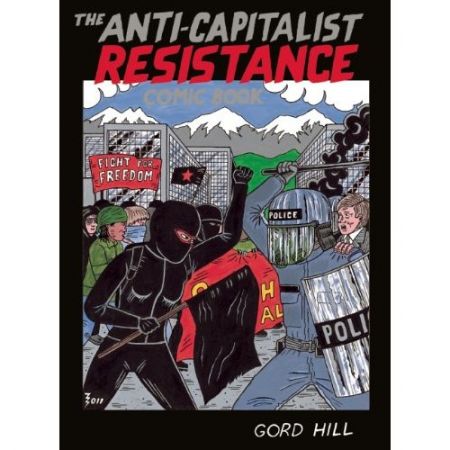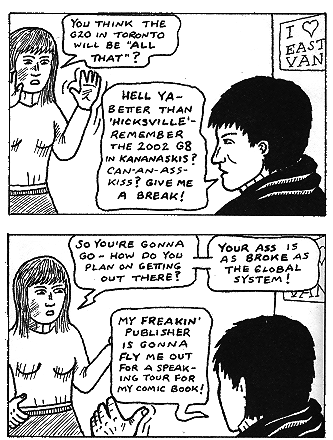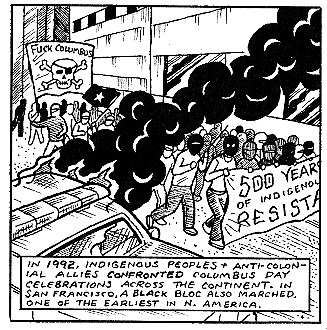STORY about ArtsDirect ActionEducationIdeasIndigenous posted on September 18, 2012 by Comrade Black
Drawing (A) Militant Resistance: Interview with Indigenous artist and author Gord Hill
From Profane Existence -
Gord Hill is probably one of the most sought after speakers, writers and artists in regards to anarchism, militancy and Indigenous sovereignty in our area. His style is unique, drawing on his own cultural traditions and combining them with radical militant analysis of capitalism, colonialism, civilization and the state, presented in a format we would understand as a comic book. I have for years admired and been influenced by the work of Gord Hill, and on a few occasions have been lucky enough to organize events that he has taken part in.
Gord is a member of the Kwakwaka’wakw nation on the Northwest Coast.
I am very greatful that he accepted my request for an interview about his work and his latest comic book.
PE: I remember you saying once that your first comic was meant in part to help Indigenous people teach their children about their history. Who did you intend to reach with this new book?
It’s pretty broad, any one who is anti-capitalist, or who thinks the system is oppressive and unjust, who question the values and ways of life of capitalist society. It’s meant for militants who may have participated in militant actions as well as those who question the validity of such tactics.
PE: One major difference I noticed was that you used a lot more humor in the new comic book. Can you talk about the importance of using humor in resistance?
With this comic I felt there was a lot more room to inject humour. I had more space to use humour in the story lines, as opposed to the 500 Years of Indigenous Resistance Comic Book which was limited in space and far more of a documentary history. Humour is very important as it is good for morale and a way of breaking the tension that is part and parcel of resistance. Humour is also a good way to undermine or subvert authority and the aura of invulnerability they try to surround themselves with. Class War from the UK was good at using humour.
PE: You write yourself into many of the stories which gives them a more personal feel, yet you never seem to write yourself as having played a major or important role?
I had a hard time starting the comic, wondering how to tell these stories, but eventually decided to just tell them as I more or less experienced them. That’s by far the easiest for me as writer and artist. At the same time I wanted to avoid portraying prominent personalities or “movement celebrities,” so I had my character involved but not central to the organizing efforts I document in the comic.
PE: You begin your book at the rise of the earliest civilizations in Europe. Why there? What is the connection between the rise of civilization and oppression, colonization, and capitalism?
It is primarily Western European colonization that has dominated much of the world over the last 500 years or so, and it is from Western Civilization that capitalism arose, so it was logical to start there.
PE: How would you define capitalism? And how does it differ from other economic systems or exchange systems?
I would define capitalism as a socio-economic system in which a wealthy elite control the means of production (land, resources, industry), and who use the state to organize and maintain this system. It arose from colonialism and imperialism. It differs from other economic systems in that it is modern, high-tech, and nearly all-encompassing of the mass society it has constructed. It is also the dominant economic system in the world today.
PE: You posit that the ‘discovery of the new world’ is what saved a dying European empire from imminent collapse. Can you talk more about this and why it was such an important moment in the story of colonization and capitalism?
In 1492, Europe was suffering from widespread poverty, ongoing military conflicts, disease epidemics, and resource depletion. The invasion of the Americas brought in new resources such as gold and silver, lumber, vast plantations for agriculture including crops and cattle, etc. The plundering of the Americas revitalized Europe and enabled it to colonize other parts of the world as well.
PE: Before publishing comic books you put out many zines, and even made a short documentary against the Olympics, as well as maintaining websites and blogs. Can you talk about why you use such varied mediums?
In such a diverse society as we now live in there is no one form of communication that will reach everyone, so we need to use as many diverse forms as possible. Not everyone listens to punk or hip hop, not everyone’s into reading a large book, or watching a documentary, etc.
PE: You really do an excellent job at including many of the smaller actions that are often left out, or many actions like the firebombing of the RBC that others might have not chosen to include, as well as placing the newer movements in a historical context that ties them to the Panthers, Spanish Civil War and Arab Spring. Can you talk about the importance of including these stories?
I consider some of these actions and movements as critical to the story being presented. The RBC arson, for example, was a link between the anti-Olympics campaign in Vancouver and the G20 in Toronto. Other writers may not see this as important in telling their interpretation of history, but for me it was important in showing the overall context of both the anti-Olympic and G20 mobilizations and the increasing level of resistance. It’s easier to grasp a particular movement or action, or its importance, by providing some historical context.
PE: How did you get involved in radical politics, and art?
I’ve done art since I was a child. I became involved in radical resistance movements after I became involved in Vancouver’s punk scene and was exposed to anarchist literature.
PE: Can you talk more about the role punk or other subcultures and music scenes play in radical politics? Do you think they still hold potential in contributing positively to radical movements?
I would say subcultures and music scenes are important to radical movements, and are vital in creating a culture of resistance from which such movements grow. Punk is one example, but Hip Hop, folk, metal, etc. all have subversive subcultures within them that can radicalize people and raise levels of awareness and understanding. In my personal experience it was a phase of development I went through which radicalized me, introduced new ideas and ways of living, that I have continued with long after I withdrew from active participation in the scene. On the other hand, being engaged in the punk scene doesn’t mean a person is a revolutionary or radical, despite their appearance. If we look at corporate music labels there are also subversive elements within this, such as Rage Against the Machine, Lincoln Park, or System of a Down. The spread of radical slogans into corporate music products shows a fairly high level of sympathy for such politics among significant aspects of the population and reminds us that capitalists will sell you the rope with which you would hang them…
PE: You also seem to take many opportunities throughout the comic to bash pacifism and liberalism. I appreciated that. Can you say why you took so many shots at them?
Pacifism is a self-defeating ideology with its roots in Christian morality and beliefs, promoted by the state because it is a means of controlling and containing resistance. In my opinion it must be discredited as a viable form of resistance.
PE: Many people would associate the Black Bloc with anarchism, and all through this comic you see various anarchist symbols, in the graffiti, on peoples t-shirts, black flags, etc, yet you barely use the word anarchist? Can  you tell us why that is? Was it intentional?
you tell us why that is? Was it intentional?
It wasn’t intentional but I can say that I’m not so interested in promoting the ideology of anarchism as I am in promoting the principals of anti-authoritarian practises, decentralized and autonomous self-organization, etc.
PE: In your last comic book you had an introduction written by Ward Churchill, who is a rather controversial author himself. And in the new one you have an forward by Allan Antliff, as well as an intro by Dave Cunningham. Can you tell us why they were chosen to write the introductions?
I was greatly influenced by Ward when I was becoming radicalized, particularly Agents of Repression and some of his writings on Indigenous struggles. I had met him in 2008 I think and thought he was a pretty cool guy. Publishers also prefer high profile people to write intros as it helps sell their books. But I thought Ward was a good choice to write the intro to 500 Years of Resistance. For the Anti-Capitalist Resistance Comic Book, to be honest, I had a hard time finding a “high profile” writer. Cunningham is a good comrade of mine, a great writer with good analysis, so I asked him to write the intro. Arsenal wanted a high profile writer to accompany Cunningham’s intro so they recommended Allan. I think their two intros complimented one another.
PE: Liberal pundit Chris Hedges published an article that harshly criticized the Black Bloc, including an interview with popular environmental author Derrick Jensen. What do you think of Hedges & Jensen’s criticisms? How do you think these types of public criticisms effect militant movements, or effect how the rest of society views those involved?
Hedge’s article was poorly written and researched and I think radicals did a good job of countering his article. Jensen appears to be rather bitter towards anarchists due their strong critiques of his analysis and activities (ie. calling the FBI because he received death threats). These types of lame ass criticisms undoubtedly have a negative effect on militant resistance, as it provides propaganda for those opposed to militancy and can sour public sentiment or sympathy.
PE: Can you talk about the connections between how lived experience informs practice and production of theory or propaganda? How your personal history and participation in various struggles impacts how you write about them?
or propaganda? How your personal history and participation in various struggles impacts how you write about them?
I think its critical that those producing theory and propaganda be involved in grassroots struggles and not just sit in front of a desk thinking shit up. The best way of checking theory is to apply it to the real world, and in a resistance movement this is accomplished through direct participation in those struggles.
PE: What are you doing now?
Right now I am maintaining the WarriorPublications.wordpress.com site, with much of it focusing on the struggle against multiple pipelines in BC. I have helped organize rallies and info nights about the pipelines.
The site for the Vancouver local of The Media Co-op has been archived and will no longer be updated. Please visit the main Media Co-op website to learn more about the organization.



